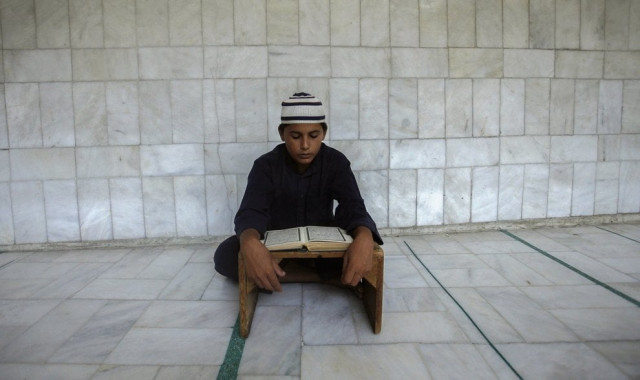Holy cows?: In capital, majority of madrassas operating illegally
Deobandi madrassas outnumber others

“At that time, a list of over 800 madrassas across Pakistan was compiled but the seminary administrations refused inspection teams to step inside their premises,” said a senior official of the ministry who requested anonymity. PHOTO: REUTERS
The religious seminaries, which have been mushrooming in the capital since 80s, may soon outnumber the government-run educational institutes.
A recent survey by the police of the number of registered and illegal madrassas in Islamabad has revealed some eye-opening facts.
In the capital alone, some 160 madrassas and 72 day scholar Quranic institutes are not registered with any of the government authorities.
The survey, jointly carried out by the police and Islamabad Capital Territory Administration, was recently shared with the interior ministry. It states that there are 401 seminaries within the capital city’s territorial limits with the majority of them running under the aegis of the Deobandi school of thought.
The number of government-run schools and colleges in the capital is 422, according to the record of the Federal Directorate of Education.
“The survey was carried out on the orders from the ministry following the Peshawar school attack,” said a senior police official, who declined to be named.
Of the total 401 madrassas, some 72 are ‘day scholar maktabs’ where children recite Quran for a few hours a day. The remaining 329 are full-time seminaries with lodging facilities for students.
Some 31,796 students are enrolled at these seminaries. Of them, 17,419 belong to Islamabad and Rawalpindi, while 14,377 hail from other parts of the country, mainly from Khyber-Pakhtunkhwa, Azad Kashmir, Gilgit-Baltistan and Fata.
The majority ‘school’
The seminaries are being run by representatives of four major schools of Islamic thought — Deobandi, Barelvi, Ahle Hadith and Shia.

The Deobandi madrassas outnumber other religious groups in the city, not only in terms of registered but also the illegal seminaries.
As per the law, a two-tier approval is required for the establishment of a seminary. First, the registration as a non-governmental organisation with the ICT Administration and subsequently a final registration with the Pakistan Madrassa Board, a subsidiary of the Ministry of Religious Affairs. Of the 329 madrassas, 206 are located in the urban areas while 123 in rural areas.
Registered and unregistered
Recently, the leadership of JUI-F and other religious parties expressed their ‘deep concerns’ over the government’s renewed efforts to curb extremism, saying it aims to target madrassas under the garb of the National Action Plan for countering terrorism.
The Deobandi school of thought, which the party adheres to, has a total of 193 seminaries of which 84 are unregistered or illegal.
Of the 118 seminaries belonging to the Barelvi school, 68 are illegal or unregistered.

The Ahle Hadith have seven registered and two unregistered seminaries while there are three registered and six unregistered seminaries being run by the Shia school of thought.
Majority of seminaries are concentrated at Sihala with a total of 44 seminaries. Of which 37 are unregistered followed by Bhara Kahu, Shahzad Town and Margalla Town with 43, 42 and 37 seminaries respectively. The Deobandi seminaries are in a majority in Bhara Kahu (28), Tarnol (24), Shahzad Town (20), and Industrial Area (18).
In 2003, during the tenure of Gen (retd) Pervez Musharraf, efforts were made to regularise seminaries through their registration with the Pakistan Madrassa Education Board.
However, most of the seminaries across Pakistan resisted the move.
“At that time, a list of over 800 madrassas across Pakistan was compiled but the seminary administrations refused inspection teams to step inside their premises,” said a senior official of the ministry who requested anonymity.
As the government prepares to tackle extremism and terrorism in the wake of the Peshawar attack, experts agree that the first step should be the registration of seminaries, said to be a hotbed of militancy, across the country.
Published in The Express Tribune, January 12th, 2015.



















COMMENTS
Comments are moderated and generally will be posted if they are on-topic and not abusive.
For more information, please see our Comments FAQ